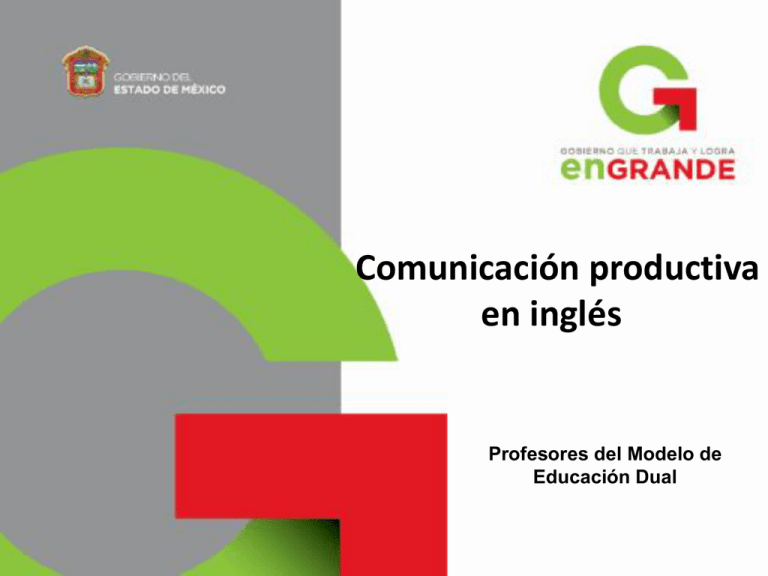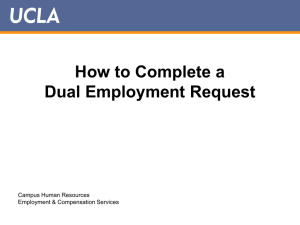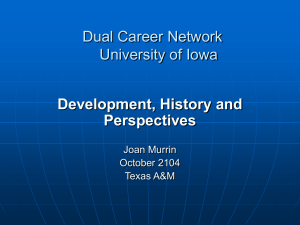Modelo de Educación Dual en el Estado de México
advertisement

Comunicación productiva en inglés Profesores del Modelo de Educación Dual Modelo de Educación Dual en el Estado de México Video Tutorial Modelo de Educación Dual en el Estado de México Unidad de Aprendizaje. Predicción de eventos o situaciones Modelo de Educación Dual en el Estado de México 1.1. Expresa planes y proyectos personales empleando estructuras de acciones futuras. Modelo de Educación Dual en el Estado de México Uso del Futuro 1. Is going to 2. Am going to Modelo de Educación Dual en el Estado de México Modelo de Educación Dual en el Estado de México Modelo de Educación Dual en el Estado de México WHAT ARE YOU GOING TO…? INSTRUCTIONS: Gather in pairs and develop the following activity: o Write down a dialogue using the future going to o Use the cues on the box to help you writing down questions for your classmate o Ask the question to your classmate and give him/her time to answer • Where/ work in the future? • What/ eat today? • At what age/get married? • Who/go on vacations with? • What car/buy when you have money? • What school/study a diploma? • When/ finish school? • Where/ live in 5 years? Example: Where are you going to work in the future? I am going to work in a software company. Modelo de Educación Dual en el Estado de México INSTRUCTIONS: Read the following sentences and and develop a the following activity: o Put the words in order to make correct sentences with GOING TO o After doing that check the sentences with a partner. o Perform the dialogue o Change roles and perform it again 1. next ▓ Colombia ▓We▓fly ▓month ▓going to ▓are▓ to ▓? 2. going to ▓? ▓When ▓leave ▓you ▓are 3. leave ▓the ▓June ▓We ▓on ▓going to ▓are ▓1st ▓of 4. ? ▓going ▓to ▓What ▓do ▓you ▓are Modelo de Educación Dual en el Estado de México 5. natural ▓ visit ▓ are ▓ We ▓ the ▓ parks ▓ going to 6. Park ▓? ▓ going ▓ Are ▓ visit ▓ to ▓ Arvi ▓ you 7. going ▓ lake ▓ are ▓ Yes, ▓ see ▓ the ▓ we ▓ to 8. going to ▓ are ▓ return ▓ When ▓ you ▓? 9. come ▓ June ▓ going to ▓ We ▓ 20th ▓ on ▓ of ▓ back ▓ the ▓ are Modelo de Educación Dual en el Estado de México Uso de Adverbios de Tiempo 1. Early 2. Late 3. Earlier 4. Later 5. In the future 6. Next week / month / year 7. Someday Modelo de Educación Dual en el Estado de México 1. Early Modelo de Educación Dual en el Estado de México 2. Late Modelo de Educación Dual en el Estado de México 3. Earlier Modelo de Educación Dual en el Estado de México 4. Later Modelo de Educación Dual en el Estado de México 5. In the future Modelo de Educación Dual en el Estado de México 6. Next week / month / year Modelo de Educación Dual en el Estado de México 7. Someday Modelo de Educación Dual en el Estado de México I have a classmate who is always taking my pens and he never returns them, how can I stop him doing that? Modelo de Educación Dual en el Estado de México My neighbor’s dog ate my daughter’s rabbit he denies it but the animal is all bitten by dogs, I know it was his dog but I can’t prove it, what can I do? my daughter doesn’t stop crying for her pet! Modelo de Educación Dual en el Estado de México I hate the smell of the cigarette just this week the most handsome boy of the school asked me out, I really want him to kiss me but I don’t want to have to smell the cigarette or I will vomit, what can I do? Modelo de Educación Dual en el Estado de México My parents want me to become a doctor but I want to be a musician, what can I do? Modelo de Educación Dual en el Estado de México My neighbor plays the drums so loud that we can’t sleep all night long, I don’t want him to keep on doing such noise, but if I call the police I will get in troubles, what should I do? Modelo de Educación Dual en el Estado de México My best friend is in love with my boyfriend, I can see the way she looks at him, I love her we have been friends since kinder but I hate her flirting with my guy, what can I do? Modelo de Educación Dual en el Estado de México Everyone expects me to get married with my best friend as we have know each other for ten years; he loves me and he says so to my family but I’m not in love with him, how can I state it clear without hurting him? Modelo de Educación Dual en el Estado de México My sister is always taking my sweaters and she never washes them after using them, I want her to stop doing that but she only laughs and tells me not to be such a grinch!, what should I do? Modelo de Educación Dual en el Estado de México I want a date with a woman that is ten years older than me, I find her fascinating, she’s everything I have dreamt but I don’t know how to ask her out, I don’t want her to reject me! Modelo de Educación Dual en el Estado de México Simple Future Simple Future has two different forms in English: "will" and "be going to." Although the two forms can sometimes be used interchangeably, they often express two very different meanings. These different meanings might seem too abstract at first, but with time and practice, the differences will become clear. Both "will" and "be going to" refer to a specific time in the future Modelo de Educación Dual en el Estado de México FORM Will [will + verb] Examples: You will help him later. Will you help him later? You will not help him later. Modelo de Educación Dual en el Estado de México FORM Be Going To [am/is/are + going to + verb] Examples: You are going to meet Jane tonight. Are you going to meet Jane tonight? You are not going to meet Jane tonight. Modelo de Educación Dual en el Estado de México USE 1 "Will" to Express a Voluntary Action "Will" often suggests that a speaker will do something voluntarily. A voluntary action is one the speaker offers to do for someone else. Often, we use "will" to respond to someone else's complaint or request for help. We also use "will" when we request that someone help us or volunteer to do something for us. Similarly, we use "will not" or "won't" when we refuse to voluntarily do something. Modelo de Educación Dual en el Estado de México Examples: I will send you the information when I get it. I will translate the email, so Mr. Smith can read it. Will you help me move this heavy table? Will you make dinner? I will not do your homework for you. I won't do all the housework myself! A: I'm really hungry. B: I'll make some sandwiches. A: I'm so tired. I'm about to fall asleep. B: I'll get you some coffee. A: The phone is ringing. B: I'll get it. Modelo de Educación Dual en el Estado de México USE 2 "Will" to Express a Promise "Will" is usually used in promises. Examples: I will call you when I arrive. If I am elected President of the United States, I will make sure everyone has access to inexpensive health insurance. I promise I will not tell him about the surprise party. Don't worry, I'll be careful. I won't tell anyone your secret. Modelo de Educación Dual en el Estado de México USE 3 "Be going to" to Express a Plan "Be going to" expresses that something is a plan. It expresses the idea that a person intends to do something in the future. It does not matter whether the plan is realistic or not. Modelo de Educación Dual en el Estado de México Examples: He is going to spend his vacation in Hawaii. She is not going to spend her vacation in Hawaii. A: When are we going to meet each other tonight? B: We are going to meet at 6 PM. I'm going to be an actor when I grow up. Michelle is going to begin medical school next year. They are going to drive all the way to Alaska. Who are you going to invite to the party? A: Who is going to make John's birthday cake? B: Sue is going to make John's birthday cake. Modelo de Educación Dual en el Estado de México USE 4 "Will" or "Be Going to" to Express a Prediction Both "will" and "be going to" can express the idea of a general prediction about the future. Predictions are guesses about what might happen in the future. In "prediction" sentences, the subject usually has little control over the future and therefore USES 1-3 do not apply. In the following examples, there is no difference in meaning. Modelo de Educación Dual en el Estado de México Examples: The year 2222 will be a very interesting year. The year 2222 is going to be a very interesting year. John Smith will be the next President. John Smith is going to be the next President. The movie "Zenith" will win several Academy Awards. The movie "Zenith" is going to win several Academy Award Modelo de Educación Dual en el Estado de México Para saber con qué grado de certeza preguntamos "how sure?" y para responder utilizamos adverbios tales como: certainly, indeed, of course, perhaps. certainly (sértenli) - ciertamente, desde luego of course (of kóors) - por supuesto definitely (définetli) - sin duda indeed (indíid) - efectivamente, de veras obviously (óbviosli) - evidentemente really (ríili) - realmente Modelo de Educación Dual en el Estado de México •I certainly appreciate your assistance. Ciertamente aprecio su ayuda. •Of course you can go out with your friends, Cindy. Por supuesto puedes salir con tus amigos, Cindy. •Without water, those plants will definitely die. Sin el agua, aquellas plantas sin duda morirán. •This is indeed a remarkable discovery. Este es en efecto un descubrimiento notable. •Obviously, we want to leave the beach before it rains. Obviamente, queremos irnos de la playa antes de que llueva. •Does she really love James? ¿Realmente ama ella a James? Modelo de Educación Dual en el Estado de México surely (shúrli) - ciertamente, sin duda truly (trúli) - realmente undoubtedly (andáutedli) - indudablemente likely (láikli) - probablemente perhaps (perjáps) - quizás, tal vez maybe (méibí) - quizás possibly (pósibli) - posiblemente, tal vez probably (próbabli) – probablemente Modelo de Educación Dual en el Estado de México •If you eat too much, you'll surely gain weight. Si comes demasiado, seguramente ganarás peso. •I'm truly sorry for the misunderstanding. Realmente me siento apenado por el malentendido. •Undoubtedly, this is the best show I've seen in my life. Indudablemente, éste es el mejor espectáculo que he visto en mi vida. •The sky is overcast so it's likely to rain. El cielo está nublado entonces probablemente lloverá. •Perhaps, that castle has been uninhabited for many years. Quizás, aquel castillo ha estado deshabitado durante muchos años. •Maybe you're right after all. Tal vez usted tiene razón después de todo. •This is possibly her best performance as an actress ever. Este está posiblemente su mejor interpretación como una actriz. •Jack was probably out when you came yesterday. Jack estaba probablemente afuera cuando usted vino ayer. Modelo de Educación Dual en el Estado de México Shall "Shall" is used to indicate future action. It is most commonly used in sentences with "I" or "we," and is often found in suggestions, such as "Shall we go?" "Shall" is also frequently used in promises or voluntary actions. In formal English, the use of "shall" to describe future events often expresses inevitability or predestination. "Shall" is much more commonly heard in British English than in American English; Americans prefer to use other forms, although they do sometimes use "shall" in suggestions or formalized language. Modelo de Educación Dual en el Estado de México Examples: • • • • Shall I help you? suggestion I shall never forget where I came from. promise He shall become our next king. predestination I'm afraid Mr. Smith shall become our new director. inevitability Modelo de Educación Dual en el Estado de México More Examples of "Shall" Modal Use Positive Forms Negative Forms You can also use: shall future action (British form) I shall be replaced by someone from the New York office. I shall be there by 8:00. I shall not be replaced after all. I shall not be there. I have a previous obligation. will shall suggestions Shall we begin dinner? Shall we move into the living room? shall volunteering, promising (British form) I shall take care of everything for you. I shall make the travel arrangements. There's no need to worry. I shall never forget you. I shall never give up the fight for freedom. shall inevitability (British form) Man shall explore the distant regions of the universe. We shall overcome oppression. Man shall never give up the exploration of the universe. He shall not be held back. should will Modelo de Educación Dual en el Estado de México Before - We should finish this exercise before 4.00. - I need to buy a present before James comes. - Before starting any business, it's a good idea to write a business plan. Modelo de Educación Dual en el Estado de México After - I'll see you after work. - Camilla won't be home until after midnight. - David got promoted after just two years with the company. Modelo de Educación Dual en el Estado de México As – Time - I dropped my keys as I left my apartment. - His health improved as he exercised more. - As time went by his English got better. Modelo de Educación Dual en el Estado de México As - Reason - I'm going to bed early as I have to get up early tomorrow. - As we're not busy, let's meet this afternoon for lunch. Modelo de Educación Dual en el Estado de México As soon as - I'll give you a call as soon as I have finished. - As soon as they go out let's eat lunch. - We'll send payment as soon as you fax the signed contract. Modelo de Educación Dual en el Estado de México Is "person" a singular or plural noun? Singular. Plural can be either persons or people, depending on the context: Interested persons please There are too many people in this room. apply at office. Person is singular, if you wanted to make it plural it would be people. ex. Who is that person (singular) vs who are those people (plural) Modelo de Educación Dual en el Estado de México Modelo de Educación Dual en el Estado de México PARA CUALQUIER PREGUNTA O DUDA COMUNÍCATE AL SIGUIENTE CORREO: modelodual@outlook.com Link para planes y programas: http://200.53.153.14/wb/Conalep/doccurrimac







